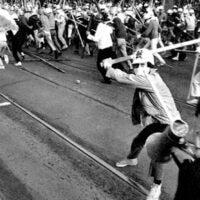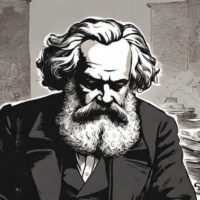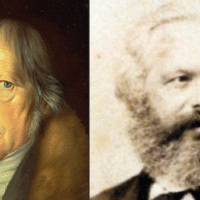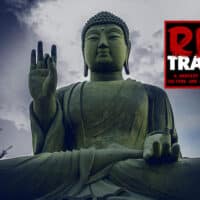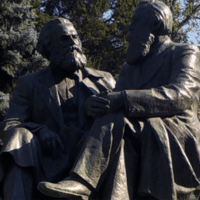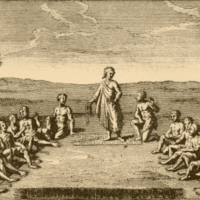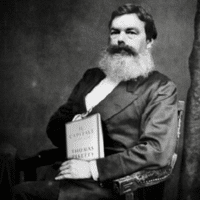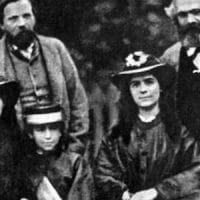-
The pitfalls of growth under unrestricted trade
The French economist J B Say had believed that there could never be a problem of aggregate demand in any economy, that whatever was produced was ipso facto demanded.
-
Karl Marx: More than an economist
In his lifetime, Karl Marx witnessed the establishment of capitalism as an all-encompassing, global system, and with it the international working class—a force capable of radical social transformation.
-
‘Principles and Methods of a Marxist Kunstwissenschaft—Attempt at an Outline’
It is not easy to explain in such a limited space which philosophical, methodological, and practical features characterize the study of Kunstwissenschaft that arose from the insights won by Karl Marx and Friedrich Engels and were enriched by Vladimir Lenin, as well as many other scholars and revolutionaries.
-
On the Marxist critique of Heidegger
How Marxists should approach the critique of Martin Heidegger.
-
Marxist theory in Japan: A critical overview
I. To summarise the reception history of Marx in Japan is no small task.1 In fact, it is essentially impossible to give an adequate overview of one of the deepest, most prolific, and most variegated linguistic repositories of the Marxist tradition. Although it remains remarkably little-known in contemporary European or North American intellectual circles, Marxism […]
-
What is the Dialectical Materialist Ontology?
Objective dialectics, i.e., the dialectical materialist ontology, first and foremost holds that the world is dominated by change and interconnection, “nothing is eternal but eternally changing.”
-
The dialectic in the service of revolution
Karl Marx (1818-83), like Georg Wilhelm Friedrich Hegel (1770-1831) before him, emphasized that human societies can and do undergo dramatic transformations, moving from one social order to another where each formation is governed by its own distinct laws, and a discontinuous logic separates one social order from the next.
-
The revolutionary spirit of the Buddha
Marx and Engels both took a surprising interest in the ideas of the great Indian spiritual leader, argues Sean Ledwith.
-
Engels: How North West England shaped an internationalist
Katherine Connelly outlines how the events and context of their times shaped the partnership and ideas of Marx and Engels.
-
Chinese scholars discuss Engels in Eastbourne
Nearly a hundred professors, experts and scholars from more than 20 universities and research institutions in more than ten countries, including the United Kingdom, China, Germany, the United States, Ireland, Spain, Romania, Denmark, Turkey and India, hold in-depth discussions to commemorate the 175th anniversary of “The Communist Manifesto.”
-
Learning from the barricade: Marx, Engels and the 1848 June Days uprising
175 years on from the 1848 June Days insurrection, Katherine Connelly explores what Paris’ working-class revolutionaries taught Marx and Engels.
-
Australia’s modern working class
More than 160 years ago, Karl Marx and Frederick Engels, in the “Communist Manifesto,” described workers as those “who live only so long as they find work, and who find work only so long as their labour increases capital”.
-
Damning imperialism: Marx’s writing on China
Working for the ‘New York Daily Tribune’, Marx excoriated the British empire’s opium trade that brought China under its influence with a staggering human cost, writes NICK MATTHEWS.
-
Karl Marx and the Iroquoi (Rosemont, 1989)
There are works that come down to us with question-marks blazing like sawed-off shotguns, scattering here and there and everywhere sparks that illuminate our own restless search for answers. Ralegh’s so-called Cynthia cycle, Sade’s 120 Days, Fourier’s New Amorous World, Lautremont’s Poesies, Lenin’s notes on Hegel, Randolph Bourne’s essay on The State Jacque Vaches War letters, Duchamp’s Green Box, the Samuel Greenberg manuscripts.
-
Women and nature: Towards an ecosocialist feminism
For Marxist ecofeminists, the domination of men over women in society and nature at large is therefore not a result of patriarchal ideas alone.
-
Thomas Piketty and Karl Marx: Two totally different visions of Capital
In his book Capital in the Twenty-First Century, Thomas Piketty has gathered his data meticulously and provided a useful analysis of the unequal distribution of wealth and income, yet some of his definitions are somewhat confusing and even questionable.
-
Engels and marriage
Friedrich Engels, whose 200th birthday falls on 28 November, had a very personal connection with Ireland. Soon after being sent to help run the family textile factory in Manchester in 1842 he met twenty-year-old Mary Burns, daughter of an Irish dyer.
-
Advertising at the edge of the apocalypse
In this article I wish to make a simple claim: 20th century advertising is the most powerful and sustained system of propaganda in human history and its cumulative cultural effects, unless quickly checked, will be responsible for destroying the world as we know it. As it achieves this it will be responsible for the deaths of hundreds of thousands of non-western peoples and will prevent the peoples of the world from achieving true happiness.





